仁爱版七年级英语-(下)-教材梳理篇(2)
仁爱版英语七年级下册 Unit6_Topic2_教材知识详解

Topic2 教材知识详解1. Wang Wei, what kind of home do you live in?王伟,你住在什么样的房子里?live in…意为“住在……”,句中的in不能省略,与前面的名词home构成动宾关系,但如果前面疑问词为副词时,可省去介词。
如:Where does Li Ming live?李明住在哪儿?(where是副词)Which city do you want to live in, Beijing or Nanjing?你想住在哪个城市,北京还是南京?(which city是名词,与live in构成动宾关系)类似的结构还有:Who do you want to go with?你想和谁一起去?2. Do you live with your grandparents? 你是与你祖父母住在一起吗?live with sb.意为“与某人住在一起”,其中with表示“和;与;跟;同”。
若表示“住在某地”要用短语live in。
如:They live in a farmhouse in the country. 他们住在农村的一所农舍。
3. Michael is looking for an apartment near our school.迈克正在找一套在我们学校附近的房间。
look for 意思是“寻找”,强调“找”的动作,后面直接跟名词。
如:I am looking for my missing gloves. 我正在找我的丢失的手套。
find强调“找”的结果,表示“找到”,后面直接跟名词。
find out意思是“找出,查明”,多指通过调查、询问之后找出、发现无形的、抽象的东西,强调目的。
如:I find my book in the desk. 我发现我的书在课桌里。
I’ll find out who has broken the window. 我要查明谁打碎了玻璃。
仁爱版七年级下册英语u6t2知识点

仁爱版七年级下册英语u6t2知识点仁爱版七年级下册英语U6 T2知识点Unit 6是七年级下学期的英语课程,本文主要介绍Unit 6下的第二个教学任务(T2)的知识点。
该教学任务的主题是“Where's the post office?”,主要内容涉及询问位置和给出位置的表达,建筑物的名称,学习使用就近一些地点表达门牌号等。
一、位置询问和回答在日常生活中,询问位置和回答位置是很常见的对话情景。
在英语中,学习如何询问位置和回答位置是很有必要的,常用的表达方式如下:1. Where's the post office?2. How can I get to the library?3. Excuse me, do you know where the nearest bank is?4. I'm looking for the supermarket. Can you help me?5. Could you tell me how to get to the park, please?回答上述问题的方式有很多,其中一些表达如下:1. It's next to the bank.2. Go straight ahead, and turn left at the second intersection.3. The library is on your right.4. You can find the supermarket on the corner of the street.5. The park is opposite the cinema.二、建筑物和地点名称当我们询问和回答位置时,建筑物和地点的名称是非常重要的。
以下是Unit 6 T2所涉及的一些建筑物和地点名称:1. Post office2. Library3. Bank4. Supermarket5. Cinema6. Park7. Hospital8. School学生需要尽可能多地记住这些名称,并且学会使用它们来描述位置和方向。
仁爱版七年级英语教材梳理篇

仁爱版七年级英语(下)教材梳理篇(1)Unit5~6&考点词汇plane, train , ship , boat , weekday , early , catch , walk , ride , play , swim ,read , always , sometimes , seldom , never , make , dance , borrow ,. keep ,return , dormitory , lab , dinning hall , classroom , easy , interesting , difficult, boring , physics , geography , art , math , history , Monday , beautiful ,large , left ,. stop , someone , turn , across , danger , last , fast , careful&目标短语thesame to 对……也一样comeon 快点儿,加油,来吧onfoot 步行takea bus/by bus 乘公共汽车havea short rest 短暂的休息inone's free time 在业余时间goto school 去上学doone's homework 做家庭作业fora little while 一小会儿atthe moment/ now 此刻,现在havelunch 吃午饭atschool 在学校,在上课havea rest 休息goswimming 去游泳listento 听……haveclasses 上课goto bed 睡觉afew 一些,少量ofcourse 当然lookfor 寻找ontime 按时,准时puton 穿,戴上;上演atthe back of 在……后面from...to...从……到……befriendly to 对……友好nextto 在......近旁,紧邻comein 进入,进来infront of 在……前面talkabout 谈论,议论putaway 将……收起;把......放回原处inthe center of 在……中心atthe end of 在……尽头alot of( = lots of) 许多,大量closeto 在……附近farfrom 远离rightnow 立即,马上acrossfrom 在......对面belate for 迟到&重点句型1.一How do youusually come to school?一I usually cometo school by subway.2.—How often do you go to the libraty?"— Veryoften.3.Very few students ride bikes.4.We'd like to know about the school life of American students.5.—What do they doin their free time?—They often play basketball or soccer, go swimming and so on.6.—What are you doing?—I'mmaking cards.7.—Excuse me , may I borrow a few Ren'aiProject English workbooks?一Of course.8.—How long can Ikeep the book?—Twoweeks.9.—What day is ittoday?一It'sWednesday/Sunday/...10.—Which subject do you like best?一I like history best.11.—Why do you like it?一Because it'seasy and interesting.12.—What time does the class begin?—Atten o'clock.13.—What's your homelike?一It's an apartmentbuilding.14.—What’s thematter/the trouble/wrong?一The line is bad.15.There is something wrong with my kitchen fan.16.—Excuse me , could you tell me the way to Dinghao Building? —Goalong this road until you get to Beisihuan Road.17.When the lights are red , wait for your turn.&功能意念1.方式—Howdo you usually come to school?—Iusually come to school by subway.2.频度—Howoften do you go to the library?—Once./Twice./Threetimes a week./Every day./ Very often. / Never. / Seldom. / Usually...3.借物—Excuseme, may / can/ could I borrow this book?—Sure./ Certainly. / Of course.—Howlong can I keep it / them?—Twoweeks. And you must return it / them on time.4.存在/不存在Thereis/isn't a small garden in front of my house.—Isthere a computer in your study?—Yes, there is. / No , there isn't.—Arethere any shoes under the bed?—Yes, there are. / No , there aren't.—Howmany pairs are there?—Thereare two pairs.—What'son the desk?—Thereare some model planes on it.Therearen't any / are no books in the schoolbag.5.位置/方位—Whereis Deling?—It'sto the east of Yongling.It'sin the east / south/ westl north/ northeast /southeast / southwest /northwestof the Ming Tombs.Whereis +名词(名词短语) /代词?It'son/at /in/ above/ under/ beside /near/behind/ next to /across from/... +名词(名词短语)/代词。
七年级下册英语仁爱版知识点总结
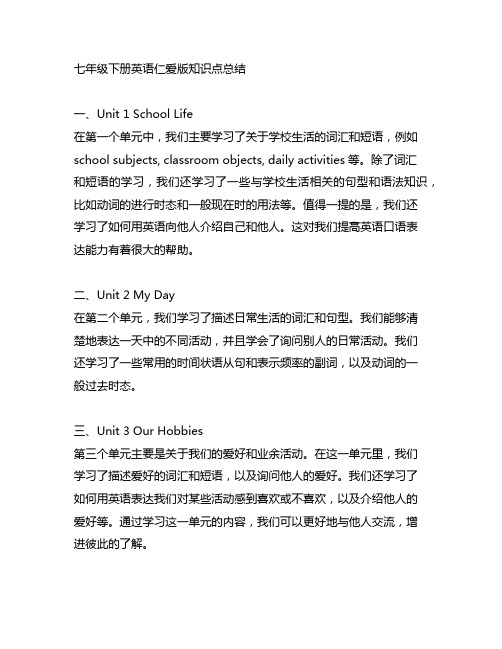
七年级下册英语仁爱版知识点总结一、Unit 1 School Life在第一个单元中,我们主要学习了关于学校生活的词汇和短语,例如school subjects, classroom objects, daily activities等。
除了词汇和短语的学习,我们还学习了一些与学校生活相关的句型和语法知识,比如动词的进行时态和一般现在时的用法等。
值得一提的是,我们还学习了如何用英语向他人介绍自己和他人。
这对我们提高英语口语表达能力有着很大的帮助。
二、Unit 2 My Day在第二个单元,我们学习了描述日常生活的词汇和句型。
我们能够清楚地表达一天中的不同活动,并且学会了询问别人的日常活动。
我们还学习了一些常用的时间状语从句和表示频率的副词,以及动词的一般过去时态。
三、Unit 3 Our Hobbies第三个单元主要是关于我们的爱好和业余活动。
在这一单元里,我们学习了描述爱好的词汇和短语,以及询问他人的爱好。
我们还学习了如何用英语表达我们对某些活动感到喜欢或不喜欢,以及介绍他人的爱好等。
通过学习这一单元的内容,我们可以更好地与他人交流,增进彼此的了解。
四、Unit 4 Celebrations第四个单元主要是关于庆祝活动。
我们学习了描述不同庆祝活动的词汇和短语,以及询问别人关于庆祝活动的相关问题。
我们还学习了一些关于时间的表达方式,比如日期、星期、月份等。
我们还学习了一些关于情感的形容词,以及表示祝福的句型和短语。
五、Unit 5 The World Around Us在第五个单元中,我们学习了描述环境和自然现象的词汇和短语,以及相关的句型和语法知识。
我们可以用英语描述不同的自然现象,比如天气、季节等,也能够表达对自然环境的关心和热爱。
除了这些,我们还学习了一些关于地点和方位的词汇,以及表示允许和禁止的句型和短语。
六、Unit 6 Amazing Stories在第六个单元中,我们学习了一些关于神话故事和传奇人物的词汇和短语。
仁爱科普版英语七年级下册英语全册知识点精讲
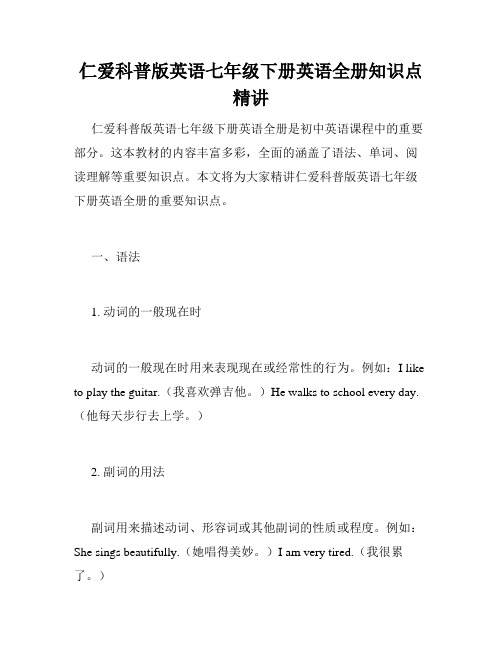
仁爱科普版英语七年级下册英语全册知识点精讲仁爱科普版英语七年级下册英语全册是初中英语课程中的重要部分。
这本教材的内容丰富多彩,全面的涵盖了语法、单词、阅读理解等重要知识点。
本文将为大家精讲仁爱科普版英语七年级下册英语全册的重要知识点。
一、语法1. 动词的一般现在时动词的一般现在时用来表现现在或经常性的行为。
例如:I like to play the guitar.(我喜欢弹吉他。
)He walks to school every day.(他每天步行去上学。
)2. 副词的用法副词用来描述动词、形容词或其他副词的性质或程度。
例如:She sings beautifully.(她唱得美妙。
)I am very tired.(我很累了。
)3. 名词的数名词的数分为单数和复数。
复数通常在名词的末尾加“-s”。
例如:Tom has two cats.(汤姆有两只猫。
)My sister has three brothers.(我姐姐有三个兄弟。
)4. 代词的用法代词代替名词,分为主格、宾格和所有格。
例如:She is my sister.(她是我的姐姐。
)I love her.(我爱她。
)This is his book.(这是他的书。
)二、单词1. 常用动词常用动词包括be(是、在)、do(做)、have(有)、go (去)、come(来)、like(喜欢)、play(玩)、take(拿)、see(看见)、want(想要)等。
2. 数字数字包括1-100以及其他重要数字的表达方式。
例如:1(one)、2(two)、10(ten)、15(fifteen)、100(one hundred)等。
3. 学科用语学科用语包括语文、数学、英语等课程中的基本单词及相关词汇。
例如:books(书)、teacher(老师)、pencil(铅笔)、geometry(几何)、algebra(代数)、history(历史)、geography (地理)等。
仁爱英语七年级下册知识点归纳

仁爱英语七年级下册知识点归纳
本单元主要介绍家庭和朋友的相关话题,包括家庭成员,家庭关系,朋友的特征等。
学生需要研究描述家庭成员和朋友的基本词汇,并能用简单的句子表达自己的家庭和朋友。
同时还会研究一些关于家庭和朋友的常见问句和回答方式。
第二单元:学校生活
本单元主要介绍学校生活的相关话题,包括学校设施,课程安排,校园活动等。
学生需要研究描述学校生活的基本词汇,并能用简单的句子表达自己在学校的生活。
同时还会研究一些关于学校生活的常见问句和回答方式。
本单元主要介绍购物和交通的相关话题,包括购物场所,购物物品,交通工具等。
学生需要研究描述购物和交通的基本词汇,并能用简单的句子表达自己在购物和交通方面的需求和经历。
同时还会研究一些关于购物和交通的常见问句和回答方式。
本单元主要介绍体育和爱好的相关话题,包括不同的体育运动,各种爱好等。
学生需要研究描述体育运动与爱好的基本词汇,并能用简单的句子表达自己对体育和爱好的喜好和意见。
同时还会研究一些关于体育和爱好的常见问句和回答方式。
本单元主要介绍节日和食物的相关话题,包括不同的节日,节日俗,各种食物等。
学生需要研究描述节日和食物的基本词汇,并能用简单的句子表达自己对节日和食物的喜好和体验。
同时还会研究一些关于节日和食物的常见问句和回答方式。
本单元主要介绍节日和食物的相关话题,包括不同的节日,节日习俗,各种食物等。
学生需要学习描述节日和食物的基本词汇,
并能用简单的句子表达自己对节日和食物的喜好和体验。
同时还会学习一些关于节日和食物的常见问句和回答方式。
仁爱科普版英语七年级下册英语全册知识点精讲
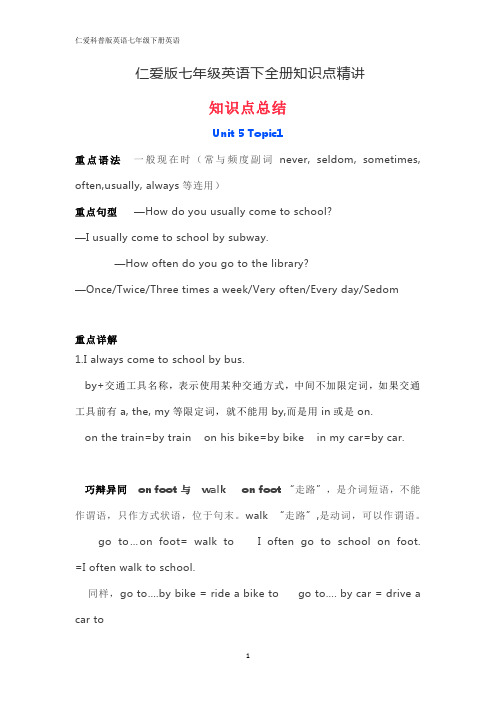
仁爱版七年级英语下全册知识点精讲知识点总结Unit 5 Topic1重点语法一般现在时(常与频度副词never, seldom, sometimes, often,usually, always等连用)重点句型—How do you usually come to school?—I usually come to school by subway.—How often do you go to the library?—Once/Twice/Three times a week/Very often/Every day/Sedom重点详解1.I always come to school by bus.by+交通工具名称,表示使用某种交通方式,中间不加限定词,如果交通工具前有a, the, my等限定词,就不能用by,而是用in或是on.on the train=by train on his bike=by bike in my car=by car.巧辩异同on foot 与walk on foot “走路”,是介词短语,不能作谓语,只作方式状语,位于句末。
walk “走路”,是动词,可以作谓语。
go to…on foot= walk to I often go to school on foot. =I often walk to school.同样,go to….by bike = ride a bike to go to…. by car = drive a car togo to … by plane = fly to go to… by bus = take a bus to 2 .Come on! It’s time for class. come on “快点,加油,来吧”。
It’s time for sth. “该做某事了”,与 It’s time to do sth.意思一样。
仁爱版七年级下册重点知识点整理(短语、句型、语法)说课稿

仁爱版七年级下册重点知识点整理(短语、句型、语法)说课稿一. 教材分析《仁爱版七年级下册重点知识点整理》是一本针对我国初中一年级学生学习的英语辅导教材。
本教材以培养学生听、说、读、写四项基本技能为目标,全面系统地介绍了初中阶段英语学习的重点知识点。
本节课我们将重点讲解短语、句型和语法三个方面的内容。
二. 学情分析七年级的学生已经掌握了部分英语基础知识,对于听、说、读、写四项基本技能有了一定的了解。
但是,他们在运用英语进行交流时,还存在着许多问题,如发音不标准、词汇量不足、语法运用不准确等。
因此,在教学过程中,我们需要注重培养学生的发音、词汇和语法运用能力,提高他们的英语水平。
三. 说教学目标1.知识目标:让学生掌握本节课所学的短语、句型和语法知识点,能够正确地运用到实际情景中。
2.能力目标:提高学生的英语听说读写能力,尤其是发音和语法运用能力。
3.情感目标:激发学生学习英语的兴趣,培养他们积极向上的学习态度。
四. 说教学重难点1.重点:短语、句型和语法知识点的掌握。
2.难点:语法知识点的运用和实际情景中的运用。
五. 说教学方法与手段1.教学方法:采用任务型教学法,让学生在完成任务的过程中,自然而然地掌握所学知识点。
2.教学手段:利用多媒体教学设备,如PPT、视频等,直观地展示教学内容,提高学生的学习兴趣。
六. 说教学过程1.导入:通过一个简单的英语小游戏,激发学生的学习兴趣,导入新课。
2.呈现:利用PPT或视频,展示本节课所要学习的短语、句型和语法知识点。
3.讲解:教师详细讲解短语、句型和语法知识点的含义和用法,让学生充分理解。
4.练习:设计各种练习题,让学生在实际操作中掌握所学知识点。
5.交流:分组进行讨论,让学生在实际情景中运用所学知识点进行交流。
6.总结:教师对本节课所学内容进行总结,强调重点知识点。
7.作业:布置作业,巩固所学知识点。
七. 说板书设计板书设计要清晰、简洁,突出本节课的重点知识点。
英语七年级下册知识点总结归纳(仁爱版)

英语七年级下册知识点总结归纳(仁爱版)英语七年级下册知识点总结归纳(仁爱版)(仁爱版)英语七年级下册知识点归纳Unit?5?Topic1重点语法一般现在时(常与频度副词?__________?________?________?______________?________?__________重点句型—How?do?you?usually?e?to?school?—I?usually?e?to?school?by?subway.—How?often?do?you?go?to?the?library?—Once/Twice/Three?times?a?week/Very?often/Every?day/Sedom 重点详解1.I?always?e?to?school?by?bus.by+交通工具名称on/in?+?a,?the,?my?等限定词+交通工具on?the?train=by?train on?his?bike=by?bikein?my?car=by?car.on?foot?___________go?to…on?foot=?walk?toI?often?go?to?school?on?foot.?=I?often?walk?to?school.go?to….by?bike?=?ride?a?bike?togo?to….?by?car?=?drive?a?car?togo?to?…?by?plane?=?fly?togo?to…?by?bus?=?take?a?bus?to2?.e?on!?It’s?time?for?class.e?on?___________?________________It’s?time?for?sth.=?It’s?tim e?to?do?sth.___________ ____________________3?.look?的短语 look?the?same________________look?like________________look?for_____________________look?after_______________4?.do?one’s?homework______________?(注意:one’s?要随主语的变化而变化______________________)。
(完整版)仁爱版英语七年级下册知识点归纳(完整版)
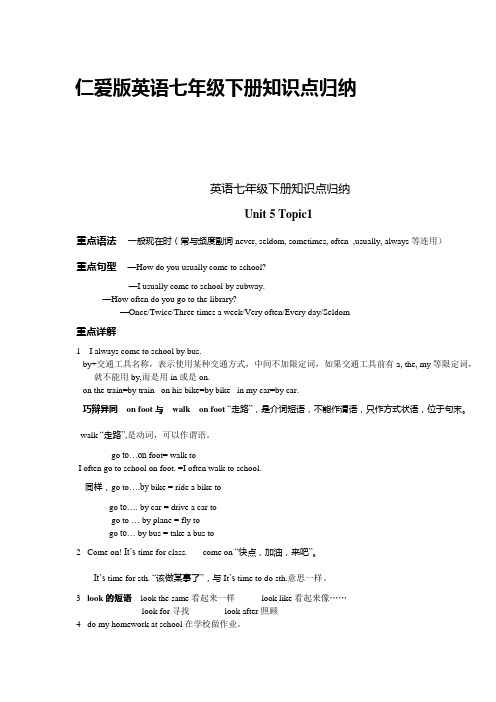
仁爱版英语七年级下册知识点归纳英语七年级下册知识点归纳Unit 5 Topic1重点语法一般现在时(常与频度副词never, seldom, sometimes, often ,usually, always等连用)重点句型—How do you usually come to school?—I usually come to school by subway.—How often do you go to the library?—Once/Twice/Three times a week/Very often/Every day/Seldom重点详解1I always come to school by bus.by+交通工具名称,表示使用某种交通方式,中间不加限定词,如果交通工具前有a, the, my 等限定词,就不能用by,而是用in或是on.on the train=by train on his bike=by bike in my car=by car.巧辩异同on foot 与walk on foot “走路”,是介词短语,不能作谓语,只作方式状语,位于句末。
walk “走路”,是动词,可以作谓语。
go to…on foot= walk toI often go to school on foot. =I often walk to school.同样,go to….by bike = ride a bike togo to…. by car = drive a car togo to … by plane = fly togo to… by bus = take a bus to2 Come on! It’s time for class. come on “快点,加油,来吧”。
It’s time for sth. “该做某事了”,与 It’s time to do sth.意思一样。
仁爱版英语七年级下册知识点归纳完整版

仁爱版英语七年级下册知识点归纳英语七年级下册知识点归纳Unit 5 Topicl重点语法一般现在时(常与频度副词never, seldom, sometimes, often ‘usually,always等连用)重点句型一How do you usually come to school—I usually come to school by subway.—How often do you go to the library—On ce/Twice/Three times a week/Very ofte n/Every day/Seldom重点详解1 I always come to school by bus.by+交通工具名称,表示使用某种交通方式,中间不加限定词,如果交通工具前有a, the, my等限定词,就不能用by,而是用in或是on.on the train=by train on his bike=by bike in my car=by car.巧辩异同on foot 与walkon foot“走路”,是介词短语,不能作谓语,只作方式状语,位于句末。
walk "走路”,是动词,可以作谓语。
go to •••on foot= walk toofte n go to school on foot. =I ofte n walk to school.同样,go to ….by bike =ride a bike togo to …. by cardrive a car to5 we want to know about the school life of American students. 我们想了解一下美国学生的学校生活。
know about“了解,知道关于…”。
6 巧辩异同a few 与fewa few“一些”,few “很少,几乎没有",修饰可数名词。
仁爱版七年级下册英语-Unit 5:Topic 2单词汇总+知识梳理(word版)

仁爱七下-Unit5Topic2知识梳理:重点短语:1. make cards 制作卡片2. on the playground 在操场上3. in the library 在图书馆4. in the gym在体育馆5. on the shelf在书架上(shelves 复数)6. at the Lost and Found 在失物招领处7.clean the room打扫房间8.have a soccer game 举行足球比赛9. have an English class 上英语课10. write a letter 写信11. some of his photos= some photos of his 他的一些照片12. on time 准时/in time及时13. do better in sth 在某方面做得较好14. show sb. around…带领某人参观……15. at the momen t“此刻,现在”= now.16. plan v.计划 plan to do sth17. be kind to sb=be friendly to sb 对某人很友好学科名词:重点短语:1. --What are you doing?-- He is cleaning the dormitory.2.-- Are you doing your homework?--Yes, I am./No, I am not.3. --How long can I keep them?--Two weeks.4. --Thank you.--It’s a pleasure/A pleasure / My pleasure.别客气。
5. --Sorry, I don’t have any.--Thank you all the same.仍然感谢你。
重点语法:现在进行时基本结构:肯定式:am/is/are+doing(现在分词)否定式:am/is/are not +doing(现在分词)一般疑问式:Am/Is/Are + 主语+doing(现在分词)+ 其他特殊疑问式:特殊疑问词+一般疑问式They’re having a meeting now.他们现在正在开会。
仁爱版英语七年级下全部知识点总结(2)(K12教育文档)

仁爱版英语七年级下全部知识点总结(2)(word版可编辑修改)编辑整理:尊敬的读者朋友们:这里是精品文档编辑中心,本文档内容是由我和我的同事精心编辑整理后发布的,发布之前我们对文中内容进行仔细校对,但是难免会有疏漏的地方,但是任然希望(仁爱版英语七年级下全部知识点总结(2)(word版可编辑修改))的内容能够给您的工作和学习带来便利。
同时也真诚的希望收到您的建议和反馈,这将是我们进步的源泉,前进的动力。
本文可编辑可修改,如果觉得对您有帮助请收藏以便随时查阅,最后祝您生活愉快业绩进步,以下为仁爱版英语七年级下全部知识点总结(2)(word版可编辑修改)的全部内容。
七年级下英语知识点总结Unit 5 Topic1㈠短语总结1.在学校大门口 at the school gate2.来学校 come to school3.去学校 go to school4.上课 have class / have classes5.步行 on foot6.骑自行车 ride a bike/ ride bikes/ by bike / on a bike7.坐公交 by bus / take a bus8.坐地铁 by subway / take the subway / on the subway9.坐飞机 by plane/ take the plane / on the plane10.坐小汽车 by car / in a car/ take a car/ drive a car11.坐轮船 by ship12.坐小船 by boat13.坐火车 by train / on the train14.在我们组 in our group15.一群学生 a group of students16.我们中的三个人 three of us17.在平日 on weekdays18.在周末 on the weekends / at weekends19.起床 get up20.睡觉 go to bed21.早起 get up early22.回家 go home23.到家 get home24.去动物园 go to the zoo25.去公园 go to the park26.看电影 see a movie / film27.看电视 watch TV28.在晚上 in the evening / at night29.帮助父母 help parents30.做某人的家庭作业 do one’s ( my/ her/ his/ your/ their)homework31.在学校 at school32.知道,了解 know about / learn about33.校园生活 school life34.一个美国学生 an American student35.在美国 in America / in the U.S.A.36.许多学生 many students/ a lot of students/ lots of students37.很少 very few38.吃午饭 have lunch39.出去吃饭 eat out40.在校期间 on school days41.休息一会 have a short rest/ break42.午饭后 after lunch43.在某人的业余时间in one’s ( my/ his/ her/ their…)free/ spare time44.打篮球 play basketball45.踢足球play soccer / football46.弹钢琴 play the piano47.弹吉他play the guitar48.拉二胡 play erhu49.去游泳 go swimming / go for a swim50.去划船 go boating51.球赛 a ball game / ball games52.一年四次 four times a year53.听音乐 listen to music54.读书 read books55.看报 read newspapers56.看医生 see a doctor57.去图书馆 go to the library58.一周两次 twice a week59.见朋友 meet friends60.每天 every day61.在七点半 at half past seven62.一小会 for a little while / for a short time63.晚饭后 after supper64.吃饭 have dinner65.吃早饭 have breakfast㈡重要句型1.I usually come to school by subway.同义句: I usually take the subway to school。
仁爱版七年级英语-(下)-教材梳理篇(2)
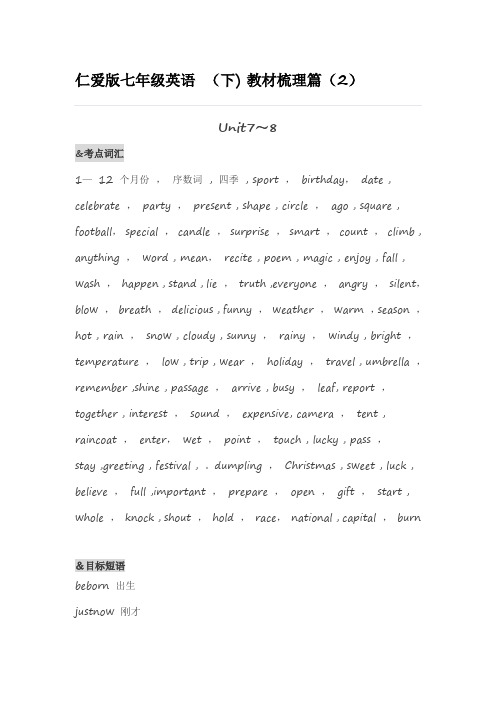
仁爱版七年级英语(下) 教材梳理篇(2)Unit7~8&考点词汇1—12 个月份,序数词, 四季, sport ,birthday,date , celebrate ,party ,present , shape , circle ,ago , square , football,special ,candle ,surprise ,smart ,count ,climb , anything ,word , mean,recite , poem , magic , enjoy , fall , wash ,happen , stand , lie ,truth ,everyone ,angry ,silent,blow ,breath ,delicious , funny ,weather ,warm ,season ,hot , rain ,snow , cloudy , sunny ,rainy ,windy , bright ,temperature ,low , trip , wear ,holiday ,travel , umbrella ,remember ,shine , passage ,arrive , busy ,leaf, report ,together , interest ,sound ,expensive, camera ,tent , raincoat ,enter,wet ,point ,touch , lucky , pass ,stay ,greeting , festival , 。
dumpling ,Christmas , sweet , luck , believe ,full ,important ,prepare ,open ,gift ,start , whole ,knock , shout ,hold ,race,national , capital ,burn&目标短语beborn 出生justnow 刚才dosome cleaning/ washing/ reading 打扫卫生/洗洗东西/读点书justnow/a moment ago 刚才havea good ( great ,wonderful , nice) time/enjoy oneself 玩得愉快take...to..。
仁爱版英语七年级下全部知识点总结
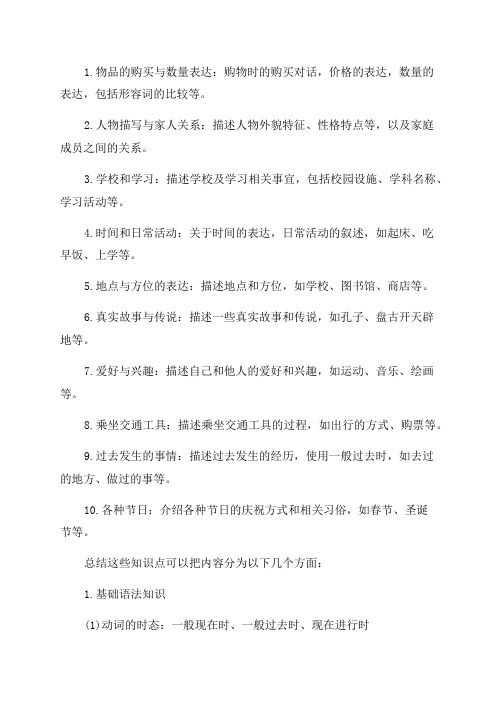
1.物品的购买与数量表达:购物时的购买对话,价格的表达,数量的表达,包括形容词的比较等。
2.人物描写与家人关系:描述人物外貌特征、性格特点等,以及家庭成员之间的关系。
3.学校和学习:描述学校及学习相关事宜,包括校园设施、学科名称、学习活动等。
4.时间和日常活动:关于时间的表达,日常活动的叙述,如起床、吃早饭、上学等。
5.地点与方位的表达:描述地点和方位,如学校、图书馆、商店等。
6.真实故事与传说:描述一些真实故事和传说,如孔子、盘古开天辟地等。
7.爱好与兴趣:描述自己和他人的爱好和兴趣,如运动、音乐、绘画等。
8.乘坐交通工具:描述乘坐交通工具的过程,如出行的方式、购票等。
9.过去发生的事情:描述过去发生的经历,使用一般过去时,如去过的地方、做过的事等。
10.各种节日:介绍各种节日的庆祝方式和相关习俗,如春节、圣诞节等。
总结这些知识点可以把内容分为以下几个方面:1.基础语法知识(1)动词的时态:一般现在时、一般过去时、现在进行时(2)名词的单复数形式(3)形容词的比较级和最高级(4)数字的表达(5)介词的使用(6)副词的使用2.日常生活用语(1)询问价格和回答价格(2)询问数量和回答数量(3)询问和描述外貌特征(4)描述家人关系和家人的特点(5)描述学校设施和学科名称(6)描述日常活动和时间(7)描述地点和方位(8)描述爱好和兴趣(9)描述交通工具和乘坐方式(10)描述过去发生的事情3.文化和传统(1)描述真实故事和传说(2)介绍节日的庆祝方式和相关习俗通过掌握这些知识点,可以在仁爱版英语七年级下册的学习中更加轻松地理解和应用相关内容,提高自己的英语能力。
仁爱版英语七年级下册知识点复习归纳(完整版)

仁爱版英语七年级下册知识点归纳英语七年级下册知识点归纳Unit 5 Topic1重点语法一般现在时(常与频度副词never, seldom, sometimes, often ,usually, always等连用)重点句型—How do you usually come to school?—I usually come to school by subway.—How often do you go to the library?—Once/Twice/Three times a week/Very often/Every day/Seldom重点详解1I always come to school by bus.by+交通工具名称,表示使用某种交通方式,中间不加限定词,如果交通工具前有a, the, my 等限定词,就不能用by,而是用in或是on.on the train=by train on his bike=by bike in my car=by car.巧辩异同on foot 与walk on foot “走路”,是介词短语,不能作谓语,只作方式状语,位于句末。
walk “走路”,是动词,可以作谓语。
go to…on foot= walk toI often go to school on foot. =I often walk to school.同样,go to….by bike = ride a bike togo to…. by car = drive a car togo to … by plane = fly togo to… by bus = take a bus to2 Come on! It’s time for class. come on “快点,加油,来吧”。
It’s time for sth. “该做某事了”,与 It’s time to do sth.意思一样。
(完整)仁爱英语七年级下册知识点详细归纳,推荐文档.docx
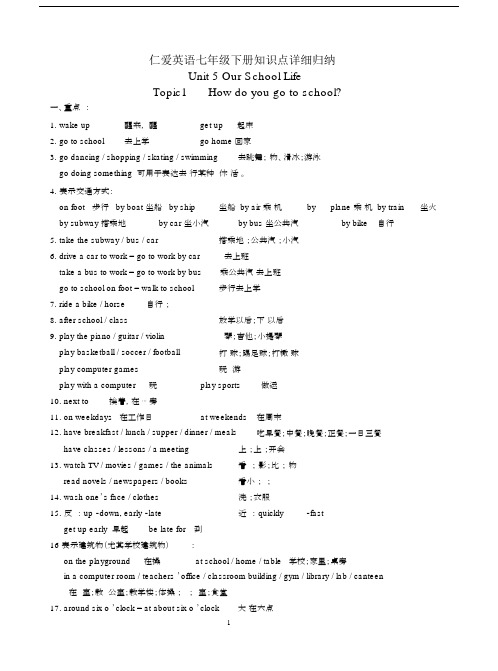
仁爱英语七年级下册知识点详细归纳Unit 5 Our School LifeTopic1How do you go to school?一、重点:1. wake up醒来,醒get up起床2. go to school去上学go home 回家3. go dancing / shopping / skating / swimming去跳舞;物、滑冰;游泳go doing something 可用于表达去行某种休活。
4. 表示交通方式:on foot步行 by boat 坐船 by ship坐船 by air 乘机by plane 乘机 by train坐火by subway 搭乘地by car 坐小汽by bus 坐公共汽by bike 自行5. take the subway / bus / car搭乘地;公共汽;小汽6. drive a car to work = go to work by car去上班take a bus to work = go to work by bus乘公共汽去上班go to school on foot = walk to school步行去上学7. ride a bike / horse自行;8. after school / class放学以后;下以后9. play the piano / guitar / violin琴;吉他;小提琴play basketball / soccer / football打球;踢足球;打橄球play computer games玩游play with a computer玩play sports做运10. next to挨着,在⋯ 旁11. on weekdays 在工作日at weekends在周末12. have breakfast / lunch / supper / dinner / meals吃早餐;中餐;晚餐;正餐;一日三餐have classes / lessons / a meeting上;上;开会13. watch TV / movies / games / the animals看;影;比;物read novels / newspapers / books看小;;14. wash one’s face / clothes洗;衣服15. 反: up –down, early –late近: quickly–fastget up early 早起be late for到16 表示建筑物(尤其学校建筑物):on the playground在操at school / home / table 学校;家里;桌旁in a computer room / teachers ’office / classroom building / gym / library / lab / canteen在室;教公室;教学楼;体操;;室;食堂17. around six o ’clock = at about six o ’clock大在六点18. 频率副词: never, seldom, sometimes, often, usually, always二、重点句型:1.It ’s time to get up.该起床的时候了。
仁爱英语七年级下册知识点归纳[2]
![仁爱英语七年级下册知识点归纳[2]](https://img.taocdn.com/s3/m/f94fbbc54b35eefdc9d3337b.png)
仁爱英语七年级下册知识点归纳(word版可编辑修改)编辑整理:尊敬的读者朋友们:这里是精品文档编辑中心,本文档内容是由我和我的同事精心编辑整理后发布的,发布之前我们对文中内容进行仔细校对,但是难免会有疏漏的地方,但是任然希望(仁爱英语七年级下册知识点归纳(word版可编辑修改))的内容能够给您的工作和学习带来便利。
同时也真诚的希望收到您的建议和反馈,这将是我们进步的源泉,前进的动力。
本文可编辑可修改,如果觉得对您有帮助请收藏以便随时查阅,最后祝您生活愉快业绩进步,以下为仁爱英语七年级下册知识点归纳(word版可编辑修改)的全部内容。
七年级下册知识点总结Unit 5 Topic1重点短语:1. on foot go …on foot = walk (to )…2。
at the school gate在学校大门口 3。
on weekdays 在平日,在工作日4. on weekends=on the weekend在周末5. after school 放学后6. after class 下课后7. after breakfast / lunch / supper 早餐 / 午餐 / 晚餐后8. in ones free time在某人空闲时间9. have a rest 休息一下10. read books 读书11。
go swimming 去游泳12。
listen to music 听音乐13. watch TV 看电规 14。
do one's homework 做作业15。
go to the zoo / park 去动物园 / 公园16. once a week 一周一次17. every day 每天18. have classes 上课19。
for a little while 一会儿20. go to bed 上床睡视21。
come on 忚点,加油,来吧22. get up 起床23. talk with / to sb。
- 1、下载文档前请自行甄别文档内容的完整性,平台不提供额外的编辑、内容补充、找答案等附加服务。
- 2、"仅部分预览"的文档,不可在线预览部分如存在完整性等问题,可反馈申请退款(可完整预览的文档不适用该条件!)。
- 3、如文档侵犯您的权益,请联系客服反馈,我们会尽快为您处理(人工客服工作时间:9:00-18:30)。
仁爱版七年级英语(下)教材梳理篇(2)Unit7~8&考点词汇1—12 个月份, 序数词, 四季, sport , birthday, date , celebrate , party , present , shape , circle , ago , square , football, special , candle , surprise , smart , count , climb , anything , word , mean, recite , poem , magic , enjoy , fall , wash , happen , stand , lie , truth ,everyone , angry , silent, blow , breath , delicious , funny , weather , warm ,season , hot , rain , snow , cloudy , sunny , rainy , windy , bright ,temperature , low , trip , wear , holiday , travel , umbrella , remember ,shine , passage , arrive , busy , leaf, report , together , interest , sound , expensive, camera , tent , raincoat , enter, wet , point , touch , lucky , pass , stay ,greeting ,festival , .dumpling , Christmas , sweet , luck , believe ,full ,important , prepare , open , gift , start , whole , knock , shout , hold , race, national , capital , burn&目标短语beborn 出生justnow 刚才dosome cleaning/ washing/ reading 打扫卫生/洗洗东西/读点书justnow/a moment ago 刚才havea good ( great , wonderful , nice) time/enjoy oneself 玩得愉快take...to... 把……带到……takephotos/ pictures 照相,拍照begood at/ do well in 擅长于某事;某方面做得好atthe age of 在……的年纪withthe help of/with one's help 在……的帮助下enjoyoneself 过得愉快atonce 立刻,马上standup 站立,起立comeback 回来,回想起来falldown 摔倒;倒下;倒塌tella lie 撒谎byhand 手工makea silent wish 许愿blowout 熄灭,(风等)吹灭inone breath 一口气takea walk 去散步goout 出去,熄灭lateron 后来bedifferent from 与……不同comeback to life 复苏,复活bebusy doing sth./ with sth. 忙于做某事/某事gettogether 聚会,联欢placesof interest 名胜apair of 一双,一副takesth. with sb. 随身携带/带在身上takeoff 脱掉;摘掉;起飞pointto 指向makemoney 挣钱putup 挂起;举起;贴(广告等)preparefor 为……做准备stayup 深夜不睡,熬夜knockon/at 敲击,敲打&重点句型1.—When/Where were you born? —Iwas born +时间/地点.2.—When is your birthday?—May 13th.3.—What's the date today?—It'sMay 8th.4.—What's the shape of your present? —It'sround.5.—How long /wide is it?—It's24/6.4 centimeters long /wide.6.—What do we use it for?—Weuse it to study English.7.—Can you dance or draw?—Ican dance. I can do it a little /very well.8.—What else can you do?—Ican dance and play the guitar.9.Did you hurt yourself?10.—Did you sing a song at the party?—Yes, I did. / No , I didn't.11.What happened to Michael at the party?12.What time did you come back home last night , Judy?13.How could you lie to me?14.Why didn't you tell me the truth?15.It's a good time to climb /for climbing mountains.16.Which season do you like best , spring, summer, autumn or winter?17.—What's theweather like in spring? /How is the weather in spring?—It's WaI1l1.It's a good season for flying kites.18.You need to take an umbrella when you go out.19.Winter lasts from December to February.20.I think you can go anytime.21.In Indonesia, you mustn't point to anything with your foot.22.You should /shouldn't take off your shoes.23.—How was yourtrip?—It waswonderful.24.—How did youtravel there?—By train.25.—How long wereyou there?—Only five days.26.Please give my best wishes to your parents.27.I hope to get together with them.28.I'd like to visit some places of interest in China.29.Christmas is the most important festiva1 in many countries.30.In China, celebrating Spring Festival is a big event.&功能意念1.谈论天气What'sthe weather like in summer?Howis the weather in...?What'a fine day!It'shot/warm/cool/cold.It'ssunny/ rainy/ cloudy/windy/ snowy/foggy.What'sthe temperature?Thelow temperature is 20"C and the high temperature is 25"C. Thetemperature is between 20"C and 25"C.2.计量—How long is it?—It's 20centimeters long.—How wide is it?—It's 15centimeters wide.Howtall /high is the building?It's130 meters tall /high.Thebuilding has 85 floors/stories.3.能够和不能够Shecan't sing any Chinese songs.—Can you dance?—Yes , I can./Yes , a little. /Yes , very well. /No , I can't. /No , not at all.I canswim now, but I couldn't swim when I was five.He'sable/unable to pass the math exam.4.意愿和打算Iwant to go to England.Wheredo you plan to go for your holidays?Wherewould Tony like to go?I'11go with you.I'mgoing to see my head teacher this afternoon.I'dlike to make a phone call to her after class.Iwant/hope to find an English pen friend;'Iplan to go to Hangzhou this summer.Iwon't see the movie again.I'mnot going to buy the book.Idon't want to live in the big city.&语法精选1.掌握基数词与序数词的用法。
2.掌握can/could 的用法。
3.学习一般过去时的用法。
4.掌握want to/planto/wish to/hope to/would like to的用法。
